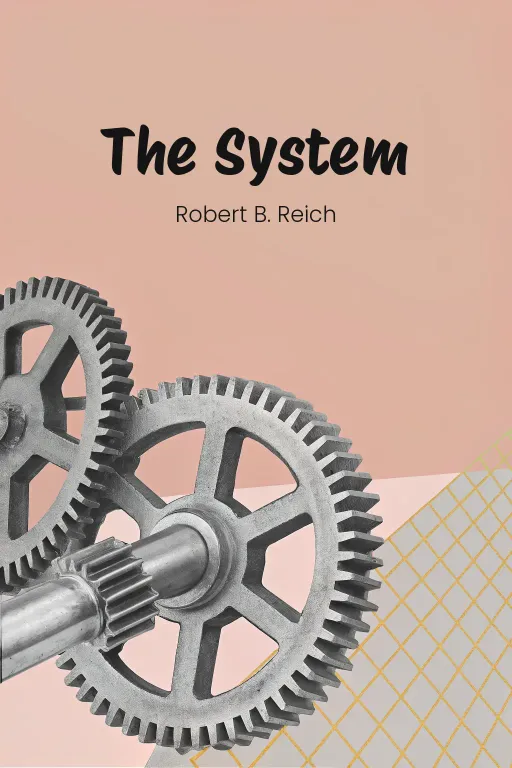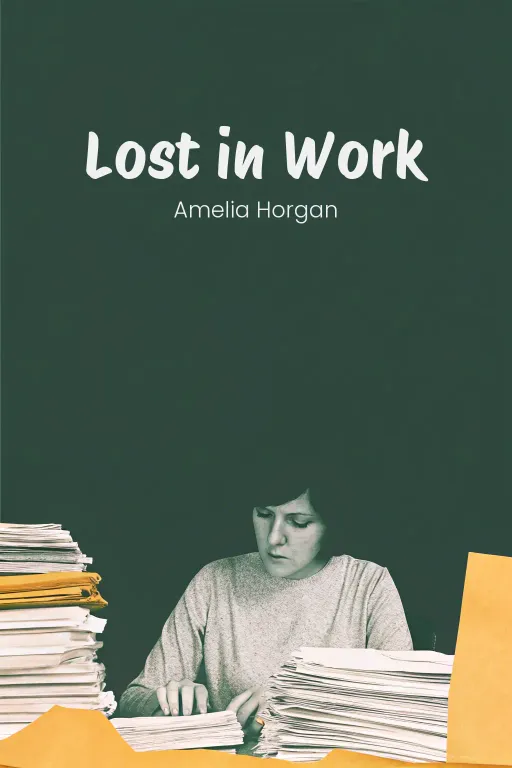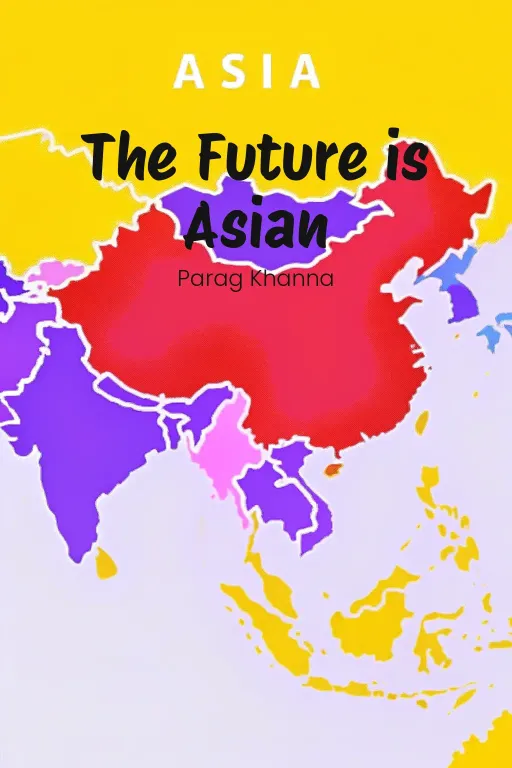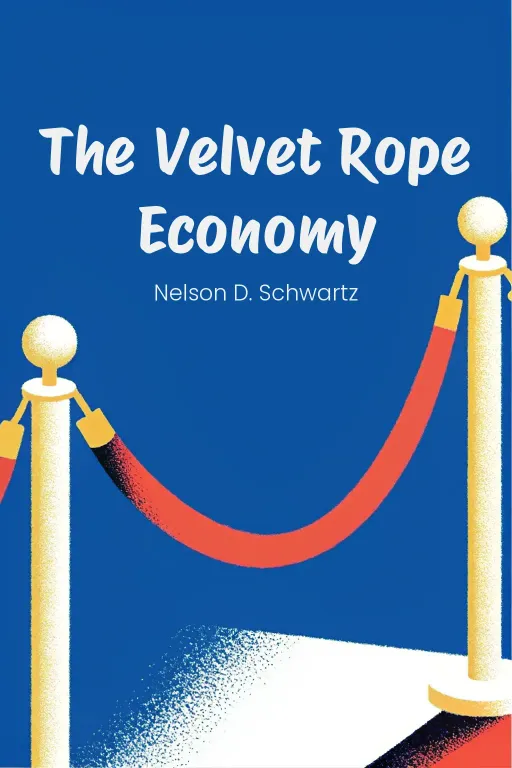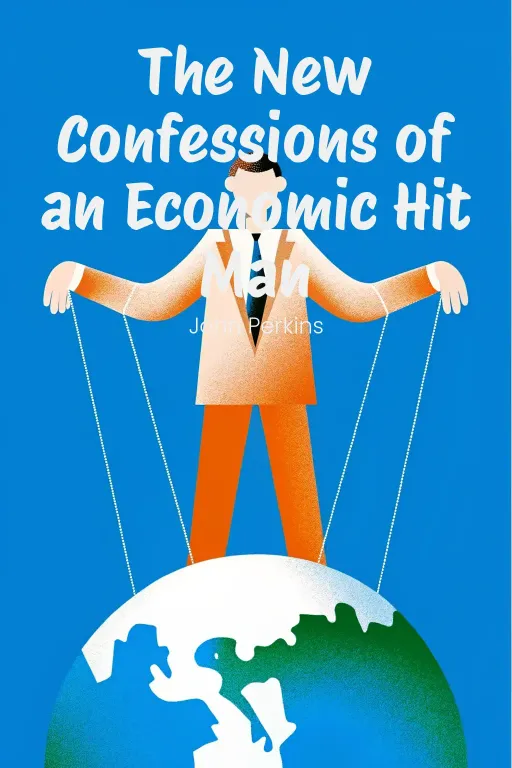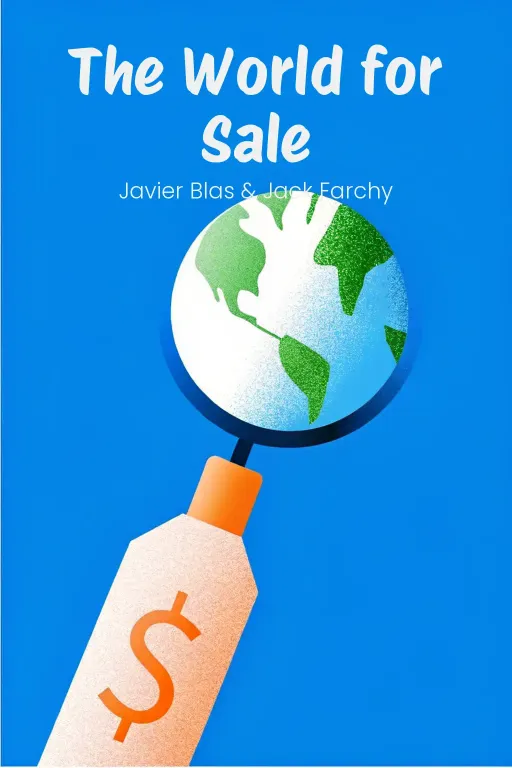
Global Debt Trap: Who Wins?
Podcast by Civics Decoded with Thomas and Grace
Global Debt Trap: Who Wins?
Part 1
Thomas: Welcome, everyone! Let's jump right in with a question: Have you ever stopped to wonder why so many developing countries seem stuck in this cycle of poverty, even after decades of aid, loans, and all sorts of “development projects”? Grace: Right? And it's like, why do those gleaming new highways, dams, or those mega-projects that international big-money lenders are so eager to fund always seem to benefit everyone except the people who actually live and work there? Well, spoiler alert: I don’t think it’s just a coincidence. Thomas: Exactly—so today, we’re shining a light on what goes on behind the scenes, with John Perkins' The New Confessions of an Economic Hit Man. This book really opens your eyes to how powerful corporations, financial institutions, and governments exploit developing nations, essentially drowning them in debt while raking in massive profits. Grace: Yeah, and Perkins isn't just spinning theories, right? He was one of these so-called Economic Hit Men, or EHMs. You know, the guys who orchestrated these schemes. So, in other words, this isn’t some generic conspiracy theory; it's an insider basically admitting, "Yeah, the whole system’s rigged, and here’s exactly how we rig it." Thomas: In Perkins’ words, EHMs are essentially hired to sell this seductive illusion: "We’re here to help you develop your country." But in reality, they’re trapping nations in debt by pushing massive loans for projects that enrich corporations, decimate local communities, and make government leaders totally beholden to foreign interests. And the consequences? Economic dependency, political puppetry, and environmental devastation all around. Grace: And, like any good redemption story, Perkins eventually had a moral reckoning and decided to blow the whistle. But this isn’t just a "bad guy gone good" story. It’s a wake-up call for all of us to take a hard look at these exploitative systems and shift away from what he calls a “death economy,” which is built on greed and destruction, and move towards a “life economy,” one that focuses on fairness, sustainability, and equity. Thomas: So, today we're going to unpack all of this in three parts. First, we’ll go through the EHMs’ playbook—the shady tactics that fuel corporate imperialism. Think of it as the "manual for exploitation" they really don’t want you to know exists. Grace: Then, we’ll really dig into Perkins’ personal journey—from being a small cog in the machine to becoming a whistleblower. But let's just say that redemption doesn’t come without having to face the complexities of the past. Can he really get away from the shadow of his past? Thomas: And finally, the big question: What can we do? Ultimately, how do we transition away from a world structured around exploitation? And Perkins offers some clear blueprints for action—everything from making different individual choices to organizing for collective resistance. Grace: So basically, we’re peeling back the layers of a pretty nasty onion—really seeing how deep the rot goes—but we'll also be planting a few seeds of hope, I think. So, yeah, buckle up, folks.
The Role and Tactics of Economic Hit Men (EHMs)
Part 2
Thomas: Okay, so let's dive right into the foundational tactics of Economic Hit Men, or EHMs . Because really understanding “how” they operate is key to understanding the roots of global inequality, right? The first tactic, and probably the most critical, is these… well, fraudulent loans for so-called development projects . Grace: Ah, yes . The loans that pretend to be about development, but are mostly about trapping countries in debt, with just a “teeny” bit of PR to make corporations look like saviors . How… original . Thomas: Exactly! EHMs basically talk leaders of developing nations into taking out these enormous loans, often saying it's for things like dams, power plants, airports – infrastructure, the whole shebang . On paper, it “looks” like it'll kickstart economic growth, but it’s rigged from the start . The loans are tied to hiring multinational corporations – usually in the Global North – to build these projects . So the money, in reality, never even “enters” the borrowing country's economy; it just goes straight back to those corporations . Grace: It's like those gift cards where all the money vanishes if you don't spend it within a week . Except, instead of losing 20 bucks, you're saddled with “billions” in debt . And, let me guess: the "gift" comes with interest rates that would make a payday lender blush? Thomas: You got it . So these nations are left with debts they can never realistically repay . Take Perkins’s time in Indonesia, for example . EHMs like him pushed for these seemingly essential electrification projects, creating this illusion of modernization . But it was devastating . Most of that money went right back to U.S. companies doing the building, and Indonesia was left paying back loans that were way bigger than any actual economic benefit . Grace: Right . And those repayment plans aren’t exactly offering “flexible options,” are they? Instead, these countries are forced to slash social programs, privatize their resources, and embrace neoliberal policies – all of which “just so happen” to benefit foreign investors and corporations . Thomas: Even worse, those debt obligations make sure these countries stay politically compliant . Perkins talks about how U.S. and corporate interests pressured governments to become these subservient allies . Debt isn’t just about money; it's a political weapon . Leaders of countries in debt often lose their power to decide what’s best for their people, becoming… well, overseers of policies dictated by whoever they owe money to . Grace: It's like signing a contract while blindfolded and then waking up to find your wages garnished, your house sold, and your boss telling you how to raise your kids . Except, in this case, it’s entire nations being coerced into giving up their sovereignty . Thomas: That's a great analogy, Grace . And if offering "financial incentives" doesn't work, EHMs have another trick up their sleeve: which is manipulation, coercion, and, at times, outright violence . Refusing these deals has consequences, and often, fatal ones . Grace: You’re talking about what Perkins calls the “jackal phase,” right? When persuasion turns into something… much darker . Thomas: Exactly . Consider Ecuador . Perkins saw firsthand loans tied to oil infrastructure not only destroyed the environment but also crushed the country with debt . And leaders like Jaime Roldós, who dared to stand up against these practices, paid a heavy price . He pushed for Ecuador to control its own oil resources, which threatened the profits of multinational corporations . Soon after, his plane... well, it mysteriously crashed . Which, uh, really sounds like targeted retribution, doesn't it? Grace: Yeah, nothing screams “random accident” like a mysterious plane crash when a leader starts questioning foreign exploitation . It's a script we've seen played out across Latin America, Africa, and other regions . You refuse, and suddenly the CIA or some other shadowy group gets involved . Thomas: The pattern is chilling . Perkins says EHMs are often backed by clandestine operatives ready to "remove" leaders who don’t cooperate . Whether it’s through political destabilization, economic sabotage, or actual assassination, the message is clear: fall in line, or face the consequences . And this feeling of fear wasn’t felt by just leaders; it spread to local communities too . Grace: So, let's talk about the “alleged” "benefits" of these development projects, because somebody obviously has to sell these schemes as being good for the people, right? Thomas: That’s the third tactic: the “illusion” of development . EHMs create grand stories about progress and modernization . But hidden beneath the shiny surface is environmental destruction, people being forced off their land, and worsening inequality . Think about Perkins's meeting with a Texaco consultant in Ecuador . He saw how oil exploration destroyed indigenous communities and the Amazon rainforest, all in the name of economic opportunity . Grace: Right – Texaco builds roads and pipelines that tear through untouched ecosystems, pollutes rivers with oil, and forces thousands of indigenous families off their land . But hey, as long as they slap a slogan on it about “fueling development,” everything’s fine, yeah? Thomas: It was heartbreakingly destructive . He even talks about seeing locals working in appalling conditions just to survive after being forced off their land by these projects . It’s a clear picture of how multi-layered this exploitation is . It's not just countries crushed by debt, it's their most vulnerable communities that often suffer the most . Grace: And the real benefits? Basically just luxury highways no one can afford to drive on, power grids that prioritize factories over villages, and elites getting richer by slicing the pie even thinner . Thomas: That’s the broader issue, isn’t it? EHMs might market these projects as win-win, but they create cycles of dependency . Debt robs countries of their ability to act independently . Which forces them into structural adjustments – privatization, austerity measures – all dictated by institutions like the World Bank or IMF . And these supposedly “helpful” policies perpetuate poverty, instead of fixing it . Grace: So what you get is this self-perpetuating cycle: debt leads to dependency, dependency leads to exploitation, and that exploitation enriches the very corporations and governments “responsible” for the cycle . It’s like creating a board game where only one player can win . Thomas: And that’s what Perkins shows us . EHMs aren’t just rogue agents acting on their own—they’re cogs in a well-oiled machine of economic imperialism . They do well because the system “needs” them to do well . And, while these tactics might sound like something from the past, these same structures exist today under new names . Grace: Like sustainable development loans or flashy green energy projects that claim to help the environment, but are really just the same playbook with a shiny new cover? Thomas: Exactly . The story might change, but the main things – debt, dependency, exploitation – are still there . The challenge, as Perkins points out, is how do we deal with this system and find different solutions . But before we get to that, I think we need to take a close look at Perkins himself . I mean, his journey, his confessions, and what that tells us about the people who work in this system .
Personal Transformation and Ethical Awakening
Part 3
Thomas: This systemic exploitation, it has such profound ethical and geopolitical consequences. And that “really” sets the stage for Perkins' personal reckoning. It's here where we shift our focus away from the mechanics of these Economic Hit Men to something much more personal: Perkins’ own journey, his ethical awakening, and how this reckoning of his shaped his advocacy. Grace: Exactly, because while it's easy to just write him off as another "bad guy turned good," his story does give us this unique window view into what it “really” takes to break free from this machinery of exploitation. And, let's be honest, not every whistleblower ends up writing bestsellers and, you know, lecturing on sustainability. Thomas: True. So, let's unpack this chronologically, as Perkins lays it out. His disillusionment “really” began during his time in Indonesia, when he had to confront the stark reality of what his work really meant. There's this one memory that stands out in particular: a project for electrification in Java. I mean, on paper, it was meant to promote progress—modern infrastructure, economic growth. But what he witnessed on the ground told a very different story. Grace: Oh, let me guess—less "bright future," more "industrial dystopia"? Thomas: Exactly. Perkins talks about seeing mothers bathing their kids in polluted rivers, entire families barely scraping by as laborers, and children just stuck in these cycles of poverty. And then, he stumbled upon this internal contradiction – there was a report in his office suggesting that these loans and projects not only failed to help the Indonesian economy, but were designed to increase its dependency. So, he began tallying up the disconnect between the polished forecasts he was selling and the crushing poverty he saw in reality. Grace: So, it wasn't just guilt, but the realization that the system wasn't, say, "flawed" or "misguided." It was working exactly as intended, funneling wealth and resources upward while leaving destruction in its wake. Thomas: Exactly, that's the realization that started to eat away at him. But it wasn't an immediate transformation, you see? Perkins wrestled with this guilt for years. He describes the psychological toll of realizing that his job, his career, was actively ruining lives and communities. And over time that cognitive dissonance just became unbearable, forcing him to make this pivotal decision – to leave his position at MAIN. Grace: Now, stepping away from a high-paying career is one thing, but leaving an institution like MAIN, where all of your skills are tied to its exploitative structure, is a different beast altogether. What was the turning point for him? Thomas: Well, it was a combination of growing guilt and a deepening awareness of the stakes. Let's not underestimate how high the costs of leaving actually were for him: losing financial security, alienating colleagues, going into totally unknown territory... What finally moved him was this moral reckoning – this sense that staying meant complicity, and his silence would make him part of this continued exploitation. So, he took that leap, resigned from his job, and eventually tried to channel that guilt into something productive. Grace: Ah, the redemption arc begins. So, what happens next? Does he just ride off into the sunset and live happily ever after? Thomas: Hardly. Perkins describes the initial years after leaving MAIN as intensely challenging. He founded an energy company that focused on renewables—Principal Power Systems—seeing it as his first step toward making amends. He viewed promoting sustainability as a way to counteract the destructive infrastructure projects he’d once championed, like oil pipelines and coal plants. Grace: So, let me get this straight. He goes from crafting debt deals for giant corporations to trying to build renewable energy ventures? That’s a pretty stark shift, though still very much within the capitalist framework. Thomas: It is, and he acknowledges that it was just a first step. Starting Principal Power Systems wasn’t just about entrepreneurship; it was also about recognizing the systemic flaws he had once perpetuated. He saw it as a way to offer alternatives—models that would prioritize environmental preservation and equitable resource distribution over profit. It wasn’t about instant absolution but about trying to contribute to what he calls a “life economy.” Grace: Okay, but let's talk about how this transformation wasn't purely about his professional choices. His encounters with leaders like General Omar Torrijos of Panama were pivotal, right? Torrijos wasn't your average head of state; the guy was practically a walking counterpoint to everything Perkins had been part of. Thomas: Absolutely. Perkins describes Torrijos as someone who embodied ethical leadership. He was deeply committed to Panama’s sovereignty and pushed back against multinational corporations that wanted to exploit its resources. Torrijos wasn’t anti-development, but he insisted that development benefit the Panamanian people—not foreign shareholders. To Perkins, Torrijos represented the kind of leader who refused to capitulate to the EHM playbook. Grace: And because the system hates anyone who tries to rewrite the script, Torrijos ended up dead under what Perkins bluntly calls “highly suspicious circumstances.” A plane crash that just so happened to occur when he was trying to renegotiate Panama’s relationship with the U.S.? Yeah, subtle. Thomas: Torrijos’ death was a major catalyst for Perkins. It hit him hard—solidifying his growing disillusionment with the system and driving home the stakes for leaders who resist exploitation. It wasn’t just about crafting economic deals; it was about the consequences for people who dared to say no. Grace: So Torrijos’ assassination isn’t just some background drama; it’s part of Perkins’ broader awakening. It’s like the final nail in the coffin for his faith in the “good intentions” of the system. That said, recognizing injustice and doing something about it are two very different things. Thomas: And that takes us to the next phase of his journey: his decision to go public. Writing Confessions of an Economic Hit Man wasn’t just a personal catharsis—it was an act of defiance against the institutions he’d worked for. He wanted to expose the truth about EHMs and the global exploitation they perpetuated. Grace: Taking that leap can’t have been a simple decision. I mean, whistleblowing on corporations and governments with global reach isn’t exactly a “safe” career path. Thomas: Definitely not. Perkins writes that one of his primary motivations was his daughter. He realized that staying silent meant leaving her—and her generation—to inherit a world shaped by the very systems he had helped sustain. That awareness drove him to speak out, even at great personal risk. His book became a rallying cry for activists, an indictment of predatory capitalism, and a call to build a new kind of global economy. Grace: And it’s not just talk either. Perkins has worked with grassroots organizations, tackled environmental justice with the Pachamama Alliance, and emphasized supporting indigenous communities in their struggles against exploitation. It’s activism with a purpose, a way of using his experiences to enable real-world change. Thomas: Which is what makes his story so compelling, right? His transformation from this well-paid cog to a whistleblower and activist doesn’t just highlight personal redemption. It underscores the possibility of leveraging individual experiences for collective resistance. And, through his efforts, Perkins challenges us to ask: If someone so embedded in the system can choose a different path, what’s stopping the rest of us?
Call for Systemic Change and Collective Action
Part 4
Thomas: This personal evolution underscores the broader need for systemic change, bridging individual action to collective movements. And that, Grace, brings us to Perkins’ ultimate vision: transitioning from what he calls a “death economy” to a “life economy.” It’s not just about individual redemption; it’s about redefining our entire economic and social systems. Grace: Okay, so it's not just patching things up, it's a complete reimagining, right? Perkins talks about moving from extraction and exploitation to equity, sustainability, and collaboration. But… what is this "life economy" exactly? How does he see us actually building it? Thomas: Well, a life economy, according to Perkins, centers on prioritizing the well-being of the planet and people over pure profit. Think renewable energy instead of fossil fuels, fair trade instead of exploitation, and empowering communities instead of corporate dominance. And it's not just about money; we need to redefine what prosperity means; thriving ecosystems, healthy communities, things like that. Grace: Sounds great, on paper. But I’m always asking, "Where’s the real-world proof?" Does Perkins give us any concrete examples of this actually working? Thomas: He does! One example he highlights is his partnership with the Achuar people in Ecuador. When oil companies threatened their lands, the Achuar partnered with organizations like the Pachamama Alliance. Working together, they fought off the exploitation, showing how indigenous wisdom and modern advocacy can challenge the "death economy." Grace: The Achuar story is pretty inspiring—and smart. They didn't just physically resist; they changed the conversation about development, proving that economics can align with ecology and culture. But that raises the big question: if they succeeded, why haven't more groups done the same? Thomas: Exactly, that gets to the heart of systemic oppression, doesn’t it? The Achuar succeeded partly because of the resources they mobilized, including global awareness. Many indigenous communities just don't have the means to fight these huge companies. They lack access to funding or legal expertise. That’s why partnerships like Pachamama are essential—they help marginalized communities participate in the movement for a life economy. Grace: Grassroots movements are one piece of the puzzle, then. But Perkins also calls on corporations to step up and change the game. That’s a big ask. What does he expect them to do, specifically? Thomas: Fundamentally, he says corporations need to shift their priorities from maximizing shareholder profits to benefiting all stakeholders—workers, communities, the environment. In practice, this means renewable energy, better labor conditions, and corporate transparency. Grace: Right. And these corporations "must" do this, but let's be real here. How do you convince CEOs to prioritize social responsibility over, say, personal gain? Thomas: Well, Perkins makes both a moral and a pragmatic argument. Morally, corporations bear a huge responsibility for today’s crises, and so should be held ethically accountable. But pragmatically, it's about self-preservation. Climate change, resource depletion—they'll destabilize the systems companies rely on to profit. Adapting isn’t charity; it’s survival. Grace: Yeah, I can see it—no one’s buying luxury goods on a dying planet. But he also points out how corporations actively undermine equity, doesn't he? Like Walmart and its tax haven schemes. Remind me how that worked. Thomas: The Walmart case is pretty extreme. Perkins shows how they created over seventy-eight offshore subsidiaries to avoid paying taxes. In doing so, they moved billions away from public funds that could’ve funded schools or healthcare. It reflects a pattern of extracting resources while leaving the costs to the public. Grace: So, essentially, we pay for their profits twice—once with cheap labor, then with cuts to public services. Textbook twenty-first century capitalism. And governments surely play a crucial part in all this too. Does Perkins think they can—or even want to—change the rules? Thomas: Yes, and that takes us back to structural reforms. Perkins advocates for things like fair trade, stricter regulations on corporations, and debt relief for struggling nations. He cites Ecuador under President Rafael Correa as a compelling example. Correa put the “rights of nature” into Ecuador’s constitution. It was a revolutionary step, prioritizing biodiversity and indigenous lands over corporate interests. Grace: Right, but Correa still faced enormous pushback from oil companies and international pressure. When you challenge the system, it fights back hard. Thomas: Exactly. Governments face intense pressure from global elites and financial institutions. Still, Correa’s example shows that governments can lead on sustainability and equity. Perkins also emphasizes international policy reforms—things like regulating tax havens and promoting fair lending to prevent debt traps. Grace: And speaking of debt traps, let’s not forget the IMF's role, right? Perkins doesn't shy away from how these institutions impose austerity measures that gut social safety nets while enriching creditors. Argentina, for example. Thomas: Argentina’s struggles are a prime example. During its financial crises, vulture funds bought its discounted national debt, only to demand full repayment down the line. This plunged the country further into crisis, decimating public programs. Without systemic reforms, Perkins argues, the cycle will continue. Grace: Okay, so we need grassroots movements, corporate responsibility, governmental leadership, and international reform. But what about us, the individuals? Does Perkins think our daily choices matter, or are we just spectators in a rigged game? Thomas: He absolutely believes individuals play a crucial role. Perkins advocates for ethical consumerism—supporting local, sustainable businesses instead of exploitative corporations. And he encourages mobilization: joining protests, demanding policy changes; individual pressure can push governments and corporations to act. Grace: So, fight the system by voting with your wallet and using your voice. Makes sense. But the big question is, is it enough? Can individual actions really tip the scales, or are we stuck hoping for the best? Thomas: That’s a valid point, Grace, and Perkins acknowledges it. Individual efforts alone won’t dismantle entrenched systems. But they’re not meaningless either. Every personal choice sends ripples. When those actions scale up through grassroots movements, they create societal pressure that’s hard to ignore. It’s about personal responsibility combined with collective action. Grace: Fair enough. So we’re talking about a multi-front battle—personal, corporate, governmental, and global. If Perkins is certain of anything, it’s that no single approach will work on its own. We’re either in this together, or we’re out entirely. Thomas: Precisely. Economic justice, environmental sustainability, and collective well-being—they’ll only be achieved if every level of society joins together. Perkins’ vision might seem ambitious, but it’s based on the idea that change is possible when we align our efforts toward a common goal. Grace: A lot to process, Thomas, but it's clear that incremental change isn’t going to cut it. If Perkins is right, we’re talking about a full-scale transformation. The question is, do we have the courage, the coordination... to actually make it happen?
Conclusion
Part 5
Thomas: Okay, so let's bring it all together. We've unpacked the playbook of Economic Hit Men—those shady loans, that forced compliance, and the illusion of progress—and how they keep these cycles of debt and exploitation spinning. We also followed John Perkins’ journey, I mean, from being part of the system to becoming its biggest critic, right? Grace: Right, and we wrapped up with Perkins' idea of shifting from this "death economy" to a "life economy." It’s a sweeping vision, touching everything from local activism to how corporations behave, government policies, and even what we do as individuals. So, it’s a pretty tall order... Thomas: Exactly, and here's the thing: these systems that Perkins talks about, they're huge, but they're not set in stone. Whether it's backing indigenous communities, making corporations answer for their actions, or just rethinking what success really means, there's a part for everyone to play in breaking down these structures that put profits ahead of everything else. Grace: Ultimately, it comes down to asking yourself—what kind of economy, what kind of future, are you actually helping to create? Real change doesn't just happen out there; it starts right here, with you and me, right now. Let’s just hope those ripples we make turn into something bigger.
